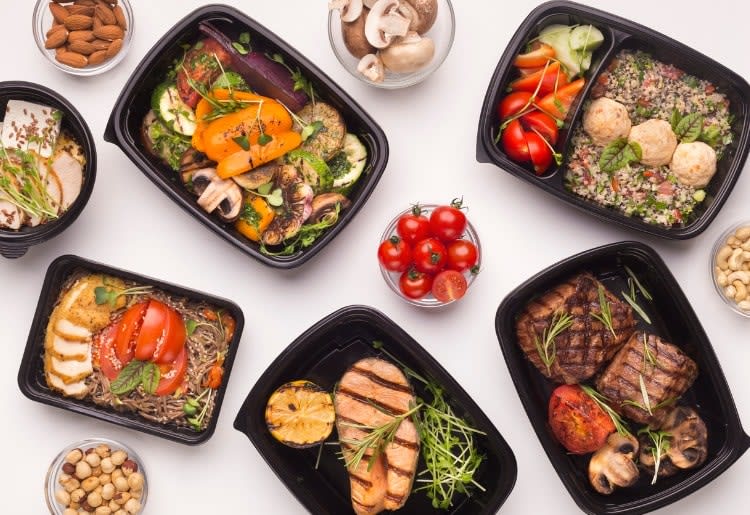Fortunately, there is a very simple way to avoid the dinner dilemma.
Using weekly meal planners is a tried-and-tested solution that includes creating a weekly menu and shopping for ingredients in advance. So instead of standing indecisively in front of the fridge, you’ll know exactly what you’ll be eating.
Eureka!
Making a weekly meal plan not only saves you the headache of meal-planning dilemmas, but it also has a lot of other benefits.
» More: The best prepared meal delivery services.
The Advantages of Weekly Meal Planning Include:
Saving time. One of the benefits of meal planning is that, instead of worrying about what to eat at each meal time, you can take a half-hour to an hour, once a week and sketch out your entire plan. Moreover, when you don’t know what you’ll be making for breakfast, lunch or dinner, you end up going to the supermarket a few times a week. But when you have your entire week of meals planned out, you can go to the supermarket just once a week with a list that includes all the ingredients needed for that week’s meals. To help save you time, here are 10 meals you can prepare.
Saving money. When you go to the supermarket once a week and buy all your food and ingredients for the entire week, you avoid the need to run out to the local, more expensive grocery store and buy dinner ingredients at the last minute. Additionally, having your meals planned out means you don’t need to resort to frequent takeout food, which can be much more costly than supermarket shopping.
Helping you stay healthy. When you don’t know what’s for dinner, it’s easy to grab a chocolate bar or order Chinese—neither of which is very nutritious. But when you plan ahead, you can make wholesome, nutritious meals that are good for your body and your mind. If you’re looking to lose weight or feel healthy, follow these diet tips.
Now that you know all the benefits of creating a weekly meal plan, let’s get to it:
Start Your Planning on a Friday
Limit the Time You Search Recipes
No Need to Go Gourmet
Check Your Pantry
Create Your Shopping List
Go Shopping
Food Prep
Freeze What You Can
Cook Double for Next Week
Don’t Be Afraid to Include a Leftovers Night
» More: Advantages of meal planning.
1. Start Your Planning on a Friday
Friday is the ideal time to create a food plan. Let’s be honest, on Friday afternoon at work, not much work is getting done. Most people have one foot out the door. For the diligent meal planner, that means you can take half an hour to plan next week’s meals. Try tasty chef-prepared meals from Diet-to-Go and get 10% off your first week!

2. Limit the Time You Search Recipes
Remember that the goal of weekly meal planning is to save time, so don’t spend too much time looking for recipes. It can be easy to get swept up in food blogs and Facebook dinner groups, so watch the clock carefully and set a limit for yourself so that weekly meal planning doesn’t take over your entire afternoon.
» Want to save even more time on cooking? Try out these top meal planning apps.
3. No Need to Go Gourmet
Creating a weekly meal plan doesn't mean you need to cook gourmet meals every night! When you choose recipes, it’s best to choose ones that you’re familiar with. Limit yourself to 1-2 new recipes per week—this way, you won’t spend too much laboring over a hot stove in the kitchen.
4. Check Your Pantry
When you come home from work, check your pantry to see what ingredients you have. You probably already have some stuff at home, which means you don’t need to include them on your shopping list. If you see that you have a bag of barley that you forgot about, you may want to revise your weekly plan to include a recipe that will use it up. If you can check your pantry on Friday morning, even better, but that may not be realistic during the morning rush.

5. Create Your Shopping List
It can take just a few minutes to create a master shopping list that includes the ingredients for all your weekly recipes. And when you do all this on a Friday, it means you have time to go shopping on the weekend and start your week off well-prepared.
6. Go Shopping
See something on sale? You don’t have to ignore it just because it doesn’t appear on your list. You can either buy it and adjust your plan, or buy it and put it in the freezer/pantry for next week. Since one of the benefits of a weekly meal plan is saving money, you don’t need to pass up a good sale just because that item doesn’t appear on your list of ingredients. Flexibility is important!
7. Food Prep
Sunday is a good day for food prep. While you don’t need to prepare every single ingredient/meal for the whole week, there are certain things that you can definitely prepare in advance. Vegetables that are cut up in advance can last a few days in the fridge, which means you only need to cut vegetables twice a week instead of every day. Choose Sunday and Wednesday as your cutting days, and you’re set for the week.

8. Freeze What You Can
The freezer is the busy person’s best friend. Whenever you can freeze prepared ingredients, do it! For example, many recipes call for sauteed onions—so instead of standing over the stove every night, saute a huge amount at once, and then freeze in batches. There are plenty of other food items that freeze wonderfully—rice, veggies, chicken, and more. When you freeze prepared ingredients, you can reduce your prep time significantly. If you’re not sure whether a certain food item can be frozen, just ask Google.
» Don’t feel like doing food prep? Try some of the best oven-ready meal delivery services.
9. Cook Double for Next Week
This might not appeal to everyone, but for people who are keen on saving time and money, cooking double is a great way to do so. For example, if you put “chicken cutlets” on the menu for one night, you can make a double portion, freeze it (see above), and then next week, you already have one night of dinner planned and prepped. You don’t need to do this with every meal, since that may get boring, but if you have a favorite, this tactic is definitely worthwhile.

10. Don’t Be Afraid to Include a Leftovers Night
Creating a weekly meal plan doesn’t mean that you can never indulge. If you know that one day will be particularly hectic in the coming week, you can schedule a takeout night. Or you can make Thursday night the night that you eat all the leftovers from the week so that you don’t have to cook anything new. Meal planning is an art, not a science, so you can take liberties and adjust your plan to suit your schedule and lifestyle.
Even if you follow all these super simple steps, you might still need a little extra help once in a while. If so, check out our list of meal kit delivery services that all offer meal planning solutions for busy people.

